#if i see one more 'batman beats up the mentally ill' i will riot
Text
Heroes and Villains are Not the Same
That's right, I hold the controversial opinion that heroes and villains are, in fact, not the same thing. Crazy, I know, but I stand by it. Let's step back a bit. Recently, I've come across a few writers and commentators saying something along the lines of "who the hero or villain is depends on who's telling the story". This sounds provocative, I guess, but it disregards a lot of standard terminology surrounding storytelling
Let’s talk about four types of character.
First, you have your protagonist and antagonist. The protagonist, obviously, is the main character. The antagonist is the character who works against the main character. Wikipedia puts it rather eloquently: "The protagonist is at the center of the story, makes the key decisions, and experiences the consequences of those decisions. The protagonist is the primary agent propelling the story forward, and is often the character who faces the most significant obstacles," while "an antagonist is a character in a story who is presented as the chief foe of the protagonist".
It is true that who the protagonist and the antagonist are depends on who’s telling the story. If Les Miserables were from Javert's perspective, then Valjean and all the revolutionaries would be antagonists. If there were a book series starring Draco Malfoy and his two cronies, then Harry, Ron, and Hermione would be the antagonists. And, yes, in these two instances, I think you could call Javert and Draco heroes; the first has a classic Greek heroic flaw, while the second goes through a long redemption arc.
Let's look at another example. If L were telling the story of Death Note, he would be the protagonist. And yes, the hero. Unlike in the other examples, he already was the hero. If you're unfamiliar with Death Note, it features a high school student, Light Yagami, who obtains the book of a Grim Reaper. If you write the name of an individual in that notebook, that person will die. Light, deciding to rid the world of horrible criminals, goes to town with it. But lest the audience see him as some tragic hero who goes down a dark path, it's made clear early on that he has a god complex—assuming the name "Kira"/"Killer"—and is willing to murder anyone who gets in his way, including the famous detective, L, who has been brought on to catch Kira. L is the antagonist to Light's protagonist, specifically, his villain protagonist.
That's why the idea that the villain and the hero are just the same thing from different perspectives is so confusing to me. We have villain protagonists. That is the other perspective. Though I feel like the insistence on heroes and villains being the same stems from our relativist culture, I think it also comes from a misunderstanding of what "hero" and "villain" mean.
A hero is a character who, generally speaking, struggles with some flaw or conflict. Their main arc deals with either overcoming this conflict or eventually capitulating to it. Greek tragedies are built around a "heroic flaw" that undoes the hero no matter how much they struggle against it. Modern superhero stories do the opposite, where the hero fights against internal vices or external foes, eventually winning the day, proving that virtue wins out over vice.
And that is the important thing about heroes: virtue. Whether or not a hero follows the path of virtue to its conclusion or ends up failing and falling off it at the end, they are at least seeking it. They are trying to be good. This is why you can essentially say that a hero is the Good Guy. The Good Guy might fail at the end, but that doesn't mean he wasn't trying his hardest until that point.
What makes a hero different from a villain? Well, obviously, the villain is the Bad Guy. No, really. A villain is "a character whose evil actions or motives are important to the plot", “a cruelly malicious person who is involved in or devoted to wickedness or crime; scoundrel; or a character in a play, novel, or the like, who constitutes an important evil agency in the plot". While a hero concerns himself with trying to lead a virtuous life, even if they fail, the villain doesn't. Maybe they actively pursue selfish and evil ends. Maybe they just don't care. Maybe they do think they're the hero (a popular idea in writing circles that will get its own blog post later), but are willing to do evil actions to achieve those good ends. The point is, while the hero pursues the good, a villain pursues evil.
So, with these as our criteria, let's look at a recent example: the 2019 film, Joker. Is this protagonist a hero or a villain?
I'll go ahead and say spoilers, but I actually don't think spoilers matter for this movie. I watched about two dozen reviews of the film before seeing it myself—to see if it would be too intense for me—so I knew every plot point going in. It was still amazing! The way those plot points were presented made them intriguing and fresh. Nevertheless, if you want no spoilers, I would bow out now.
Joker is the story of a man beaten down by society and circumstance. Arthur Fleck, as he is named at the beginning of the story, is a mentally ill man working a low-paying job at a clown-for-hire agency. His life is pretty awful: he gets beat up by teenagers, his coworkers don't respect him and even fear him due to his illness, he lives in a somewhat shabby apartment with his elderly mother, his therapist doesn't listen to him, and so on. All this pressure and anxiety finally come to a head when three jerk businessmen on a subway start assaulting Arthur while he is still in his clown costume. He shoots two of them in self-defense, then runs down the final one and shoots him in the heat of the moment.
Due to the swirling unrest in the city—there's a garbage strike going on, the social service budget has been cut, businesses are closing down, and so on—this nameless clown striking out against three rich men starts a movement. The unhappy masses don clown masks. Then they start protesting. Then they start rioting. While all this is happening, Arthur soaks it in. Though he states that he’s not political and doesn't believe in anything, he clearly likes seeing people imitate his look. He likes seeing the story of the killings in the news.
Eventually, through several more dark turns in the plot, he learns that his mother has lied to him about who his father is (maybe? The story kind of suggests that maybe his birth certificate is forged? And there's the writing on the back of that photograph? I don't know...), and that she allowed him to be mercilessly abused as a child. He makes a speech here, about how he has never in his life been happy, but that he realizes his life is not a tragedy, but a comedy. Then he smothers his mother with a pillow.
This is truly the moment he throws away "Arthur Fleck" and becomes the Joker, underlined by him dyeing his hair green and donning an orange and purple three-piece suit. He kills again, on television nonetheless, then basks in the rioting and burning he has caused. He thinks it's funny. Now, we not only have Arthur Fleck turned into the iconic Joker, but we have the city turned from an admittedly grimy and unjust place into the mask-clad-murderer infested burning hell hole that is the Gotham we know.
So, is the Joker a hero or a villain? Does it matter how you look at it?
One of the reasons this movie was so popular—aside from being about the most famous comic book villain ever—was that different sides could see what they wanted in it. Those in favor of movements like Antifa could point out the economic injustice that led to the riots; the movie makes no attempt to hide how unjust the society in Gotham is. People who see such movements as dangerous can say that, even if there were reasons for the protesting, at the end of the movie innocent people were murdered and the city is literally on fire, which the film also presents as a pretty bad thing. Maybe if Arthur was helped to get proper medication and counseling, he wouldn't have felt so hopeless, and thus wouldn't have become the Joker. True. Maybe if Thomas Wayne or child protective services had stepped in—since they both apparently knew Arthur was being abused as a child—and removed him from his mother, his life would have had a totally different trajectory. Yep.
No matter what particular political message you want to take from it, the fact is that Joker, the movie, is about the failure of society to address wrongs and about the chaos that comes when no one does anything about it. Remember, at this time in Gotham, there is no masked vigilante looking out for the little guy. Not yet, at least.
It's also a movie about one of the most iconic villains ever. The fact is, Arthur does not care about starting a movement. He likes that he did, because at least people are noticing him, but he doesn't care. He doesn't care that people are rioting and that the city is on fire, but he likes that the rioters look up to him. He doesn't care that he killed three businessmen on a train, or smothered his mother, or hacked up a colleague and got covered in the guy's blood, or that he shot a talk show host on live TV, or murdered his doctor at the end of the movie, because he liked doing it.
Yes, he does have a motive beyond that: revenge, for being lied to, or made to take the fall, or for being made fun of. As he says: What do you get when you cross a mentally ill loner with a system that treats him like garbage? You get what you deserve. He has a point, and he's bitter, but he also really likes killing people. Throughout the movie, he laughs uncontrollably at inappropriate times— almost always when he is nervous or uncomfortable with the situation. But what does he do after he kills? He dances. Because he likes it. He may not be happy, but he still thinks he's in a comedy.
And that is why we can say that he is not the hero of his own story nor the hero of a Batman movie where it's told from the Joker's perspective. Because as sad as Arthur Fleck's story is, he's never trying to be virtuous, he's just trying to get by. In the end, the way he chooses to get by is through murder. It's tragic, but, as he himself says, it's not a tragedy. He's not a tragic hero. He's a comic villain. The only thing that depends on who’s telling the story is whether or not you get the joke.
#joker 2019#joker 2019 spoilers#joker movie#heroes and villains#protagonist#antagonist#hero#villain#literary analysis#movie analysis#literary commentary#movie commentary#writelr#writeblr#protagonist vs hero#hero vs protagonist#villain vs antagonist#antagonist vs villain#writing blog#relativism
36 notes
·
View notes
Text
So, I guess I’m an agent of chaos now
I just watched Joker (2019) and, can I say, holy heck it was good. Spoilers to come.

While watching it, I found myself comparing it to what I knew of the Joker from the comics and the animated series. The Joker is more force of nature than man; he has no rhyme or reason to what he does. He exists in Gotham, not to make a statement, but to put on an act.
In that regard, I was sorely disappointed. This Joker had a name, he was Arthur Fleck. He had a job and family and, based on how often he got the piss taken out of him, plenty of reason to put on a mask and try to blow up parliament.
They even went the route of making him mentally ill so that his madness was not a conscious choice, as I’d always consider to be the Joker’s case.
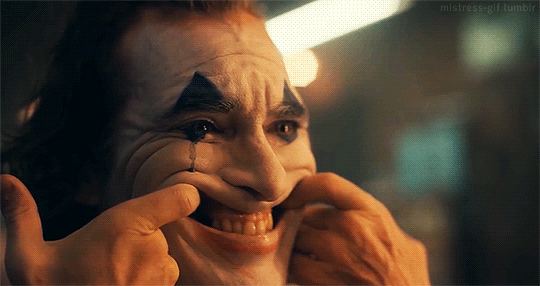
About halfway through, I decided to stop doing that and watch it as its own product. Not an adaptation, but a new origin. After doing that, I found that he started to hit a lot of the same beats that I’d originally expected.
Arthur Fleck, for one, checks most of the boxes for ‘societal trash’. He was poor, single, mentally ill and not incredibly attractive. He was largely inoffensive and not prone to violence or even self defence. He had no dreams of grandeur, he only wanted to get by and be happy doing so. Arthur was an entire demographic wrapped up in one neat package. He wasn’t a person, he was an archetype; a symbol. Until the turning point of his character, he was like all members of society that shared even one of his traits: a joke.

When Arthur kills the three boys on the subway, his symbology took off. A clown, a joke of society, was powerful enough to take out the creme de la creme. Of course people took this as a sign. They were jokes too and they could absolutely overthrow the bourgeoisie. Even better, they didn’t need to be ‘normal’ to do it.
The best part of the whole thing, and my main point, is that Arthur didn't care. He was a symbol and, like most symbols, didn't give a damn what he was used for. Arthur went through his life, picking up the scraps life tossed him, while, around him, Gotham churned and swirled with madness underneath a thin skin of normalcy.
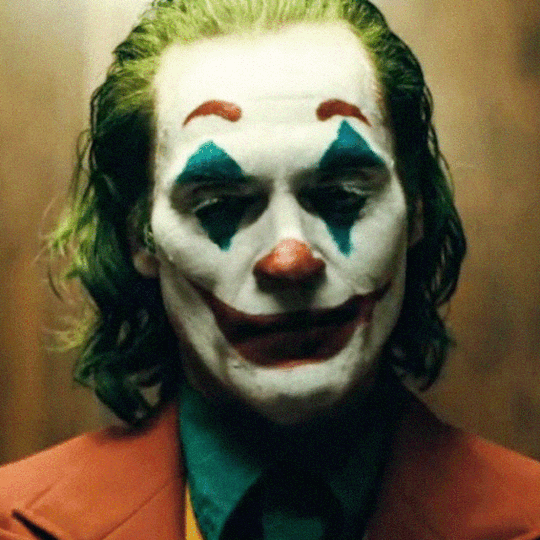
My point thus far, to clarify, has been that Arthur is tied to society. His madness forced down to facilitate an air of ‘okay’ is mirrored by the Gotham citizens rearing to eat the rich, but resigning themselves to peaceful protest. In that vein, when Arthur snapped, so did Gotham.
At no point did Arthur, now named Joker, decide to do anything about Gotham’s financial inequality problem. He kills several people in the film, all for personal gain. Three kids on the train for assaulting him, his mother for lying to him and facilitating his childhood abuse, a former coworker for aiding and almost being entirely responsible for him being fired and a talk show host for humiliating him on television. Joker only ever killed people he was angry or upset with. Likewise, the people of Gotham did the same. They rioted. They stole and destroyed and killed the people that they were upset with.
Most of all, and my ultimate point about this Joker, is that the ideology was infectious. I found myself cackling alongside him. He wanted his own brand of chaos and I wanted mine. The citizens of Gotham wanted their chaos and my friend beside me wanted hers. We didn’t necessarily want the same thing and we didn’t have to, we were all a little Joker inside and Joaquin Phoenix’s performance inspired us all to act on that without ever committing and saying that it was the right thing. At it’s core, it isn't the right thing, but the Joker isn’t concerned with morality.
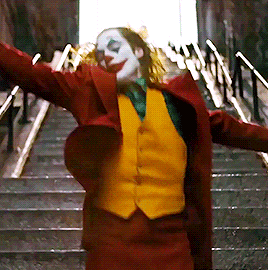
The best part was that he set the groundwork for the Spirit of the Joker. Arthur Fleck is not a very intelligent man. He’s not stupid, no, but he isn’t concoct-a-chemical-that-makes-you-die-laughing smart. And he isn’t evil. He isn't concerned with eating the rich or stabbing the poor and he certainly doesn’t care for money. But other people do.
By the end of this movie, I could see how every single iteration of the Joker could have been inspired by this one. How, after each one died, another took up the mantle. This first Joker, a reasonably aged man when Bruce Wayne was 10, is not necessarily the one who fights him in his career as the Batman.
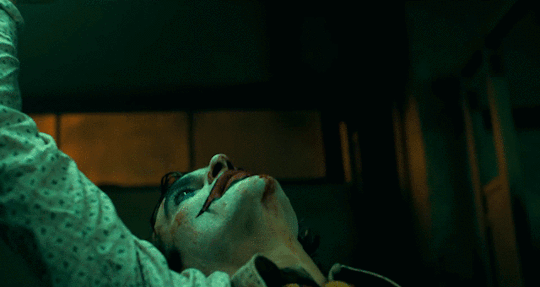
In conclusion, Joker was an amazing piece of cinema and proof that DC knows what its doing if it stops following in the shadow of Marvel.
On a side note, did anybody else notice that he had a lot of black women in his life? Like, damn.
#joker 2019#joaquin phoenix joker#joker film#dc comics#dc#the joker#clown#gotham#laughter#madness#movies#2019#great performances#Joaquin phoenix#v for vendetta#chaos#riots#mob#dangerous#eat the rich#stab the poor#burn the middle class
139 notes
·
View notes
Text
Joker
Back in 2008, Christopher Nolan released The Dark Knight. Its villain was The Joker, played brilliantly by Heath Ledger, who sadly passed away but rightfully won the Best Supporting Actor award at The Oscars. Heath’s portrayal was dark and violent, and for me, one of the best pieces of acting I’ve seen. In the film we never saw the events that led him to be The Joker, he was already the psychotic criminal we know. Towards the end of The Dark Knight the Joker says to Batman ‘madness is like gravity, all it takes is a little push’. In Todd Phillips’s Joker, starring Joaquin Phoenix as The Clown Prince of Crime, we finally see the events. We see the ‘push’ that turns a man into the criminal we all know.

Man, I’ve been excited for this real for a looong time. At first, I was slightly apprehensive, mostly because Heath Ledger did such a fantastic performance that I thought nothing would come close. When I heard that Phoenix was the lead I grew less anxious, he is a fantastic actor. By the time the trailers came around and we was told it was going to be a gritty, realistic portrayal I was sold. The week leading to the release I controlled my emotions down, tried not to get too excited in case it was shit, and went in indifferent. But my god, the movie was better than what I could have hoped for. I saw it again the day after release and honestly I think I could already watch it again. I was blown away by so much, the cinematography. I loved the build up, reflecting the build up inside Arthur Fleck who later becomes The Joker. The shots hardly moved and there were so many close ups, trying to get us inside his mind. The mise-en-scene, the locations, the lighting, the costumes. It was all beautiful. The music, composed by Hildur Guðnadóttir created the haunting mood of the film. It all came together superbly to make a wonderful movie. It felt like a real film, nothing over the top or constant cgi, it felt real. No doubt, a huge aspect of this was down to Phoenix who was incredible as Arthur Fleck/Joker. Arthur is a mentally ill person, who suffers from negative thoughts, isolated from society. He gets harassed on the streets, people think he is weird because of his condition (he laughs uncontrollably in bad situations), he never gets the joke and he lives in a society that doesn’t care about mental illness. The budget is being cut he is told. It’s hard not too have sympathy for him. This is an unhappy man in an evil society, a dangerous combination.

As with everything, there were a couple of things that I didn’t enjoy. Whilst the first two acts of the movie were absolute perfection, I thought the last act wasn’t as good. When Fleck became the Joker I was slightly disappointed. I wasn’t a fan of how confident and cocky he had become. It could just be that I enjoyed watching the transformation so much that the end product couldn’t live up to that. That being said, there were still some really cool and fantastic scenes with him as The Joker. I wasn’t a huge fan, I thought there was a fantastic ending but then another scene followed. And I get it, because I think the film would have got more criticism if it didn’t show this but I think from a film point of view, it just would have been more chilling to end it without showing the last scene.
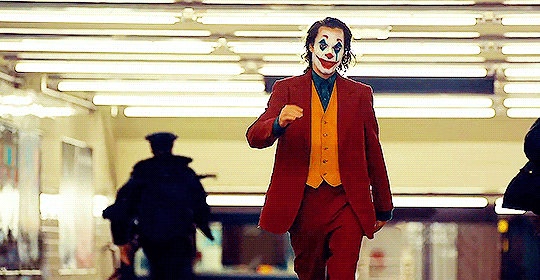
There’s been a lot of criticisms about this film, for it’s portrayal of violence, empathy we may feel towards Arthur and it’s anti-capitalist messages. Personally, even though the film was dark and haunting, I didn’t actually think it was that violence. I might criticise it for not being violent enough for its 15 rating. They could have done more violence, a lot of films are violent but I think what’s different about this is that we do sympathise with Arthur. He is bullied at work, we learn about some childhood difficulties, he suffers from a mental illness. It’s hard not too look at this down and out man and not feel sorry for him. The line however is when the murders start taking place. That’s when the audience should sit up and not feel empathy for him. So no matter how much of an absolute prick someone is, we shouldn’t kill them. OK audience! Another criticism has been about anti-capitalism. Arthur kills 3 rich men as they are beating him up. Their deaths start a huge riot in Gotham about the elite in society and the working class taking back control. Arthur inadvertently becomes a figurehead for this movement. I’m all about the working class taking back control, but let’s just do that by nationalising stuff, not killing people, cool? Cool. I think the film should be praised for how it handled mental health, it showed what government cuts can do and there isn’t the help available. UP THE REVOLUTION BROTHERS AND SISTERS. There are so many debates about this film, and they are all quite interesting and should be open for discussion. Everyone has a valid opinion, unless you’re a Tory, in which case you’re a twat.
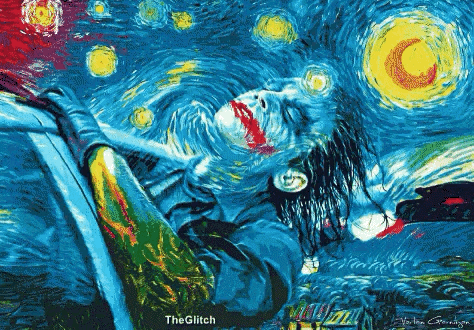
(wrong film but how pretty is this)
5/5
This film was incredible. It was everything I thought it would be and more. Technically, the film was so impressive and even more so was the performance of Joaquin Phoenix. His portrayal was so dark and haunting, and yet beautiful at the same time. I don’t need to watch another film this season to see a better performance, hands down to win Best Actor!
#movies#movie review#cinema#cinema review#film#Film Review#new#the joker#joaquin phoenix joker#joaquin phoenix#the dark knight#batman#DC comics#dc cinematic universe#todd phillips#heath ledger
61 notes
·
View notes
Text
Azrael
“My name is Azrael, and I am probably the closest thing you'll ever see to an avenging angel. At least in this life.” - Azrael
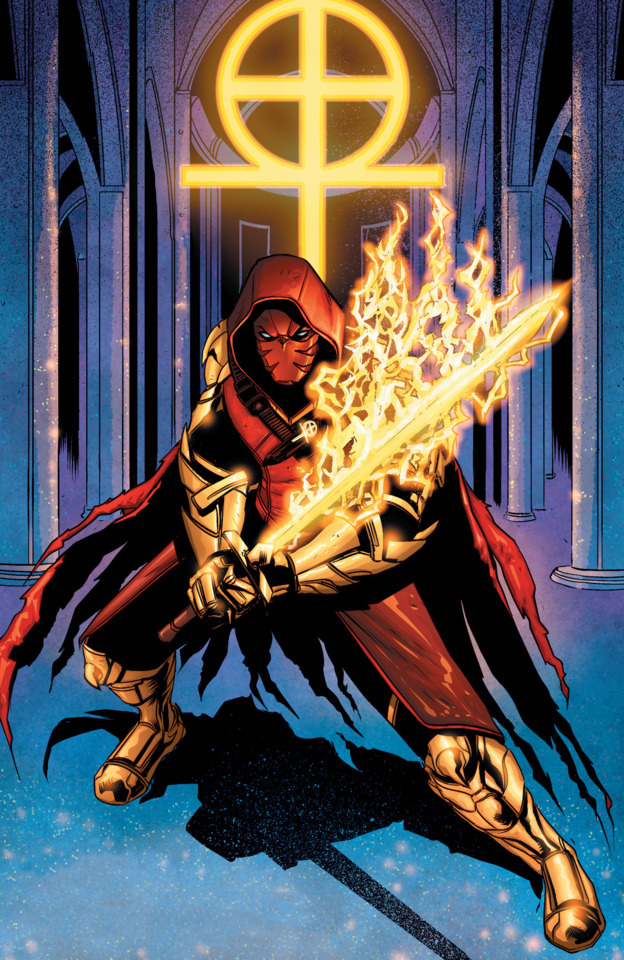
Real Name: Jean-Paul Valley Jr.
Aliases:
Batman
Johnny Valli
Gender: Male
Height: 6′ 2″
Weight: 210 lbs (95 kg)
Eyes: Blue
Hair: Blonde
Powers:
Genetic Enhancement
Abilities:
Acrobatics
Computer Operation
Hand-to-Hand Combat (Advanced)
Intimidation
Investigation
Multilingualism
Mechanical Aptitude
Swordsmanship
Swimming
Artistry
Medicine
Weaknesses:
Mental Illness
Equipment:
Kevlar Body-Armor
Battle Gauntlets
Universe: New Earth
Base of Operations:
Ossaville
Gotham City
Citizenship: American
Parents: Jean-Paul Valley, Sr.; father
Marital Status: Single
Occupation:
Student
Security Guard
First Appearance: Batman: Sword of Azrael #1 (October, 1992)
Appearance of Death: Azrael: Agent of the Bat#100 (May, 2003)

Powers
Genetic Enhancement: Raised in a test tube and put through various DNA experimentation in his fetal state, Jean-Paul's physiology allows him enhanced strength, speed and reflexes, and even durability.
Accelerated Healing
Enhanced Senses
Enhanced Durability
Enhanced Stamina
Enhanced Strength
Enhanced Speed
Enhanced Reflexes
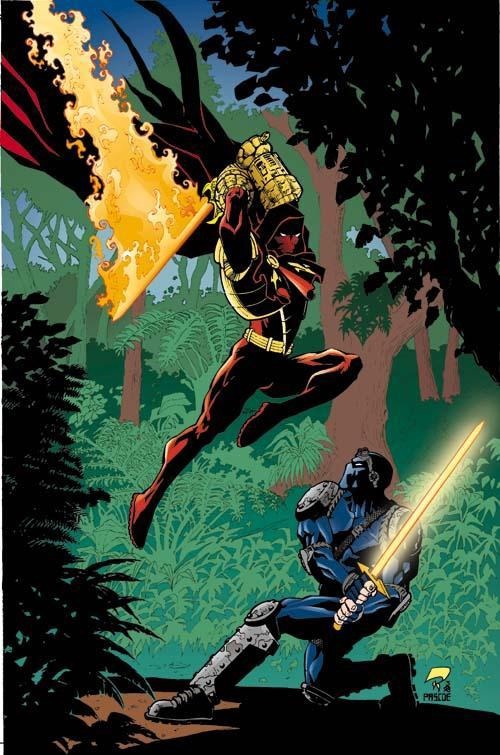
Abilities
Acrobatics
Computer Operation: Jean-Paul Valley studied Computer Programming at Gotham University.
Hand-to-Hand Combat (Advanced): Mental programming from The System has led Azrael to become a vastly above-average hand-to-hand fighter. While not on the same skill-level as Batman, he has proven himself more than capable of handling most physical threats. This was mainly due to that fact that his full combat potential was limited by his easily exploited Mental Illness. Batman has asserted in the past that if not for this factor, Azrael could become a better fighter than him.
Intimidation
Investigation
Multilingualism: Thanks to the System, Jean-Paul is able to understand foreign languages.
Mechanical Aptitude: Thanks to the system, Jean-Paul could design and create objects from scratch, as his batsuit.
Swordsmanship
Swimming: Jean-Paul proved to be an excellent swimmer, crossing a turbulent river.
Artistry: Bruce Wayne noted the talent of the artist from Jean-Paul.
Medicine: He learned a lot while working with Dr. Leslie Thompkins.
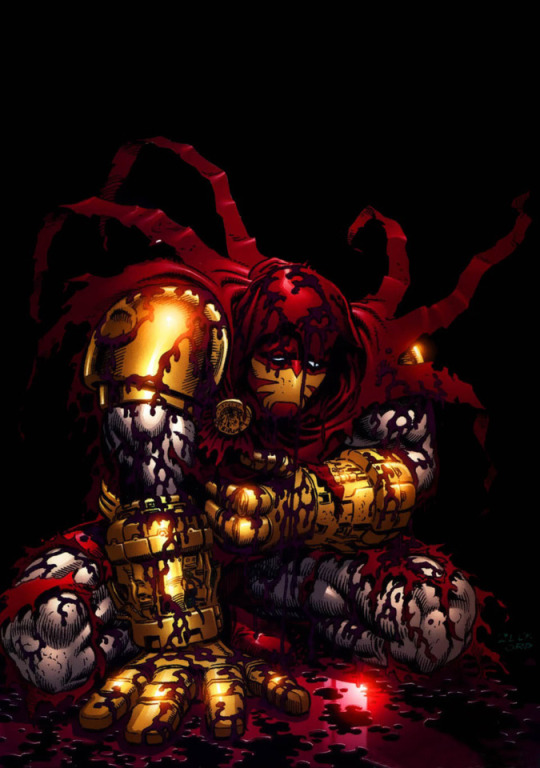
Weaknesses
Mental Illness: The Sacred Order of St. Dumas purposefully built an almost split-personality into Jean-Paul Valley. While the "normal" persona of Jean-Paul Valley was quite passive and mild mannered, and had no seeming irregularities, the Azrael persona is much more ragingly violent, and believes itself to be the manifestation of an actual biblical angel of vengeance. Originally, he was only able to manifest his superhuman abilities while in the Azrael costume and mindset. Later in his career, although he was still plagued by inner demons, and often even hallucinations, he gained better control over his two conflicting personalities, including the ability to utilize Azrael's abilities while acting as Jean-Paul.
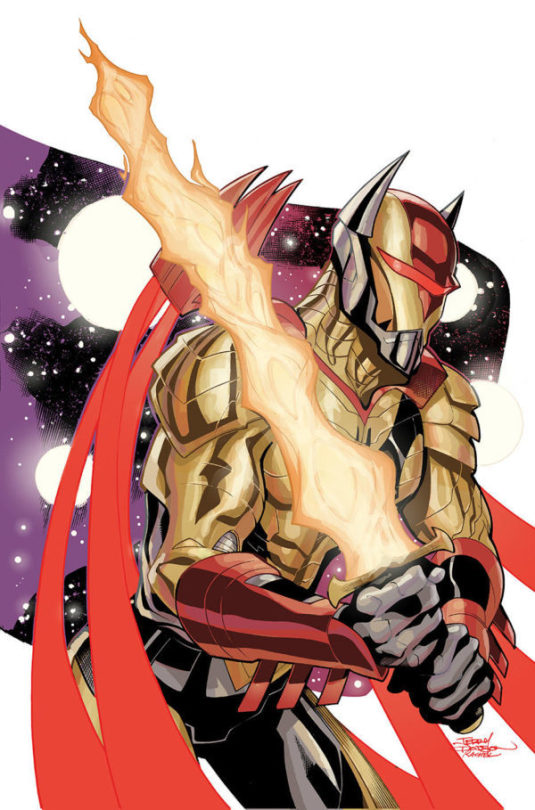
Equipment
Kevlar Body-Armor: Azrael's suit was bullet and fire resistant.
Battle Gauntlets
Projectile Blades: The blades telescope to the sleeves of the gauntlets and remain attached to prevent loss.
Flaming Sword: A fire module on the base of the gauntlets feed fuel for the blades to ignite.
Flamethrower
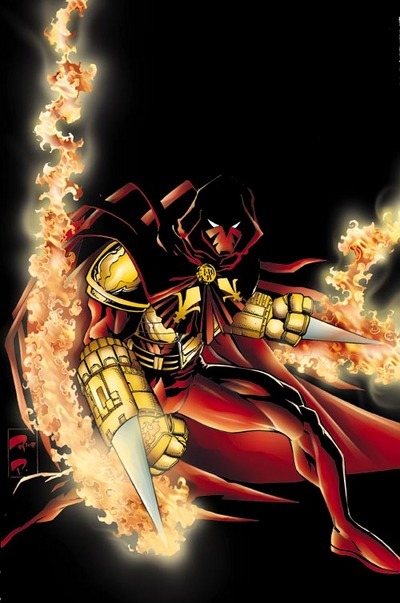
Personalities
Due to the effects of "The System," Jean-Paul Valley developed a sort of split personality; Himself and Azrael. While Jean-Paul Valley was kind, gentle, and could be described as a "computer geek," Azrael was irritable, violent, and vengeful. This contrast was strongly evident in this respect: As the sect that conditioned him was a largely medieval organization, other members of the Batman Family would notice that occasionally Azrael's solutions to problems would ignore easier actions he could have taken using modern technology. For example, during the events of "Contagion" where he had to deliver an antidote recipe into the quarantined Gotham City, he attempted a mad rush of the surrounding fences past the military, and did succeed; but meanwhile his accomplices simply e-mailed it to the hospitals. This is contradictory to his mindset as Jean-Paul, who would normally, as a student of programming, been very aware of the possibility of such a solution. He also had a smaller, less developed personality, which he began to regress into shortly before his death; Batman. During his time as Batman, Jean-Paul had developed a third personality that combined the intellect of Jean-Paul Valley and the bloodlust of Azrael, but lacked the empathy and compassion of Jean-Paul Valley. It has been theorized that Jean-Paul's continued mental illness was only due to emotional and familial neglect from either of his father, or Batman.
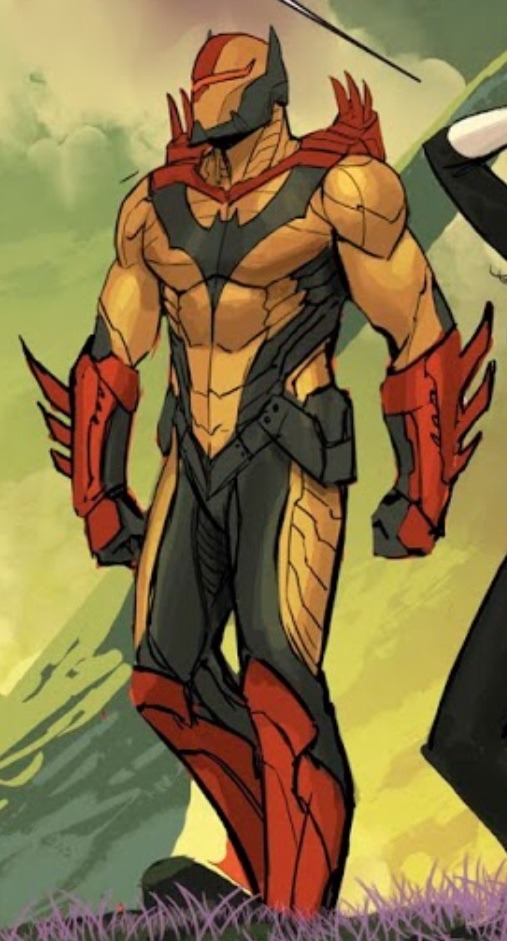
Overview
Jean-Paul Valley, better known as Azrael, is a vigilante who formerly operated out of Gotham City. Most of his extraordinary abilities come from severe amounts of subconscious training and conditioning he was put through during his youth, unaware that he was being controlled by a 500-year old devout religious sect called the Order of St. Dumas. Named after the Angel of Death, Jean-Paul Valley is actually descended from a long line of crimefighters using the Azrael suit and name. As Azrael, his main nemesis was Carleton LeHah, an evil man of wealth who believed himself to be serving the demon Biis, the Order of St. Dumas' sworn enemy.
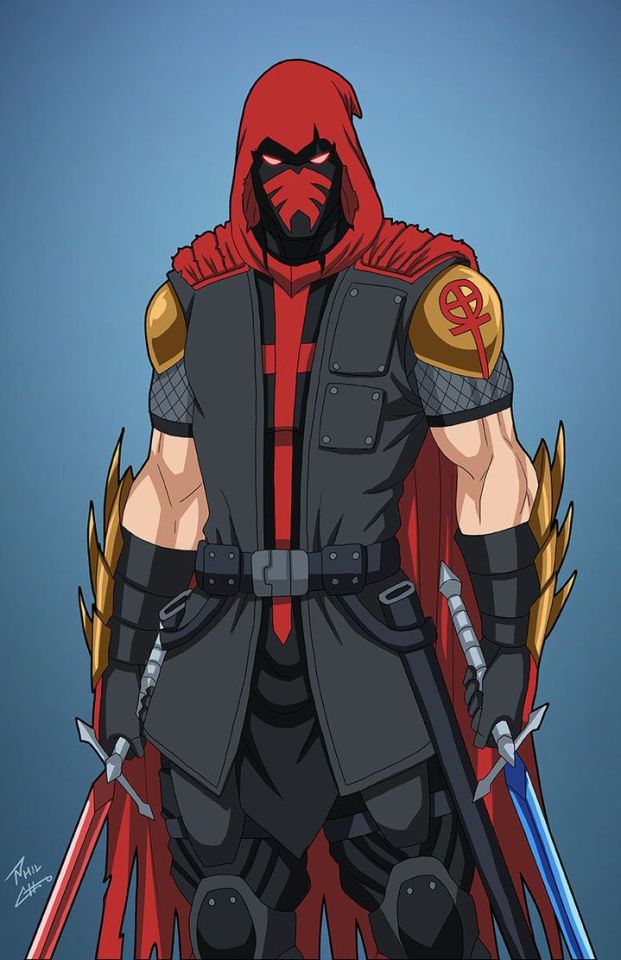
Origins
A test-tube baby, from his conception Jean-Paul's genetic structure was altered by scientists with Animal DNA, engineering him to be capable of feats beyond those of a normal human. He grew up oblivious to his intended larger purpose, and became a student of Programming at Gotham University. He learned of his family's legacy when his father, the previous Azrael, crawled bleeding to his apartment one night in costume, having been mortally wounded by LeHah. Before requesting that his body be dumped somewhere where the family secrets wouldn't be uncovered, his father supplied him with money, and the means to travel to Switzerland and meet with the Order of St. Dumas who would supply him with his training. It was later revealed that his father had actually been attempting to supply Jean-Paul with the means to escape the Order's influences, but his intentions were misread.
In the Swiss Alps, a man named Nomoz taught Valley of the responsibilities of Azrael, and revealed that despite believing himself to be rather mild-mannered, he was in reality already a more-than-capable fighter requiring no additional training, having been already unknowingly suitably conditioned. His conditioning is the result of a process referred to as "The System", the full implications on the human psyche of which have never been fully explained. In his first time donning his costume, Azrael meets Batman, accompanied by his butler Alfred, who had traveled to Switzerland investigating the mystery behind Azrael's father's death, the nature of which had inadvertently instigated a riot. Although at first they were at odds with each other, Azrael was eventually forced to rescue Bruce from Biis, and ended up rejecting the Order's violent and uncaring methods in favor of the more humanitarian efforts Batman encourages.
Already being aware of Wayne's secret identity, he traveled back to Gotham and began working with the Batman Family.
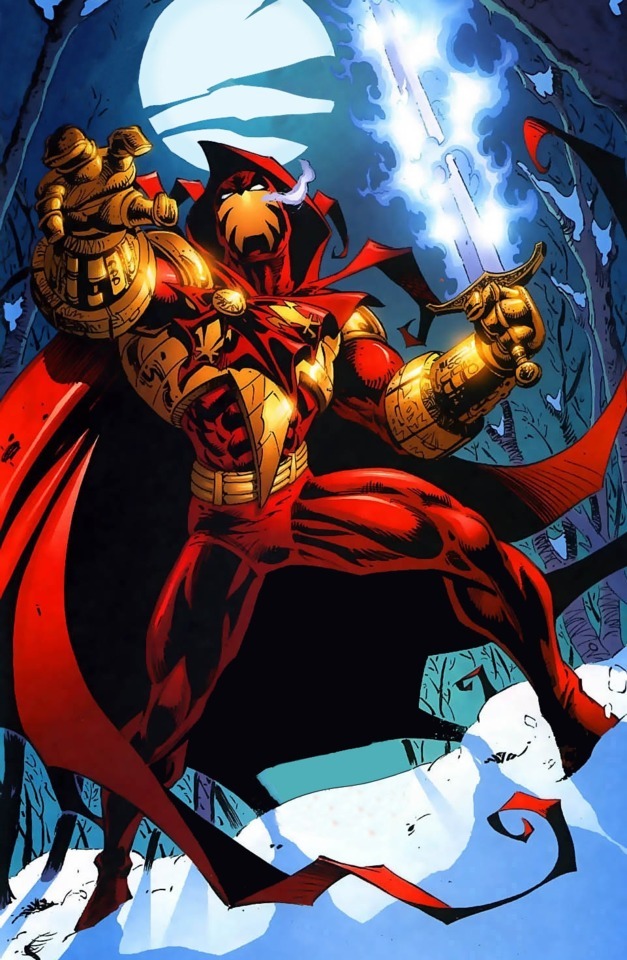
Knightfall
Bruce quickly sent Robin to train Azrael as a new vigilante and to control "The System". Valley was given a job as a security manager at Wayne Enterprises, where he also debuted as part of the selected group of vigilantes. Jean-Paul continued fighting crime, but it was obvious that the violent nature from "the system" wasn't going away. Jean-Paul did some work for Batman and after that, he saved Lucius Fox from a certain death. One night, Bruce was out of action and Jean-Paul took the mantle of the bat for the first time against Killer Croc and failed miserably. After the defeat, Jean-Paul's appearance and attitude changed to became more aggressive and he trained harder to increase his strength. In order to redeem his mistake with Killer Croc and to test the result of his training, Jean-Paul went out to the streets of Gotham to patrol all alone. He encountered a couple of common thieves and beat them to a pulp.
After Bane broke Bruce Wayne's spine, Jean-Paul joined Alfred and Robin and rescued Batman from the streets. Later, he helped Robin get a special medicine for Bruce's recovery. With Bane rising to the power, Gotham was in need of Batman and Bruce asked Jean-Paul to fill in for him; a role that Jean-Paul accepted in a much more sinister way than expected. In his first exploits using the mantle of the Bat, Jean-Paul worked without Robin, unleashing his wrath on common criminals before learning about Scarecrow's latest activities. Jean-Paul located Scarecrow, but as he was about to capture him, he had to confront Anarky. Scarecrow used fear on Anarky and Jean-Paul, but because of the System, Jean-Paul was not entirely affected and he finally stopped Scarecrow. As he left with the madman to deliver him to the authorities, Jean-Paul threatened Anarky to stay out of his way.
Confident after his initial victory, Jean-Paul became a more brutal Batman and forced a confession out of the notorious gangster Tony Bressi, who provided some information on Bane. Jean-Paul used Bressi to lure Bane, but he was instead confronted by Bane's henchmen. Using his new metallic gloves, Jean-Paul brutally defeated the trio and couldn't get further information as the police arrived at the scene and he was forced to flee. After learning the facility where Bane's henchmen were locked, he released them and used them to get to Bane. The confrontation between the two was short as Bane got the upper hand in the fight. However, Jean-Paul managed to break free and both of them decided to retreat for the next confrontation. Jean-Paul was determined to take down Bane and with The System actively working on him, he designed and built his own battle armor, which he used in replacement of the Batsuit. With his new gear, Jean-Paul confronted Bane and after a long fight, he managed to defeat him, sparing his life and earning the city's respect and rightful claim to the Batman title.
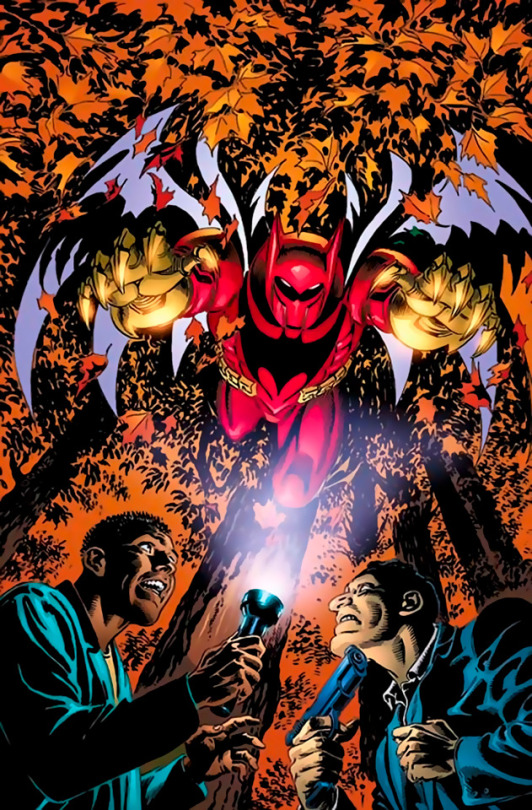
The Crusade
In his role as Batman, Jean-Paul started using a new method of transportation developed by Harold: the Batsubway Rocket. After this new development, Jean-Paul sealed every entrance to the Batcave that he knew about, effectively closing Wayne Manor and driving Robin away. He was also part of the Bloodbath mission launched by Amanda Waller against the Taker.
As Batman, Jean-Paul became unhinged and confronted several minor criminals, crippling them and hurting them beyond comprehension. Jean-Paul brutalized the Tally Man after the criminal tried to kill him, thinking he was the original Batman. Later, Jean-Paul tried to force an alliance with the organized crime by creating a gang war which resulted in his confrontation and brutal defeat of the mercenary Mekros. Afterwards, Jean-Paul stopped the Trigger Twins during a train heist and not long after this, he confronted Mister Freeze at the Gotham Morgue.
Jean-Paul eventually confronted Catwoman as he assumed she was involved in a terrorist attempt, but he couldn't bring himself to capture her as he was oddly captivated by the Catwoman. Jean-Paul chased Catwoman to a building in Gotham and their confrontation attracted the attention of the GCPD. Surrounded by officers, Batman jumped off the building, leaving Catwoman to fend for herself. However, he was summoned by Catwoman, who used the Bat-Signal to ask for his help capturing the real terrorists. Unfortunately, this was all a set-up and Jean-Paul was used by Catwoman to distract the criminals while she prevented the terrorist attack.
After this, Jean-Paul became the target of the latest Joker scheme. Paul was lured into a deadly trap created by the Joker inside a filmmaking studio, where he defeated several hired killers and stopped the madman. However, Paul had to be restrained by the GCPD from brutalizing Joker, which caused doubts among the officers and detectives who used to trust in Batman.
After stopping a child smuggling racket, Jean-Paul stopped the serial killer Abattoir from killing his cousin, but was unable to capture the criminal. It was also around this time that Jean-Paul's delusions intensified and after a nearly fatal encounter with The Corrosive Man, he decided to upgrade the Batsuit for further protection.
Jean-Paul later worked to recapture the serial killer known as Abattoir and he crossed paths with Ballistic, who was also looking for the killer. Together, they stopped the Malevolent Maniaxe from getting to Abattoir first and afterwards, Jean-Paul continued the search by himself. During this search, Jean-Paul was attacked by Lady Clay, but he soon learned that she had been forced to do so as Abattoir had kidnapped her newborn son, Cassius. Jean-Paul incapacitated Lady Clay and saved her son, allowing Abattoir to escape. Afterwards, Jean-Paul confronted Cassius' father, Clayface 3 and also incapacitated him, allowing the authorities to lock him and help his son.
Afterwards, Batman was informed by Bullock about a certain super-sniper and Jean-Paul confronted Gunhawk and Gunbunny, but he is no match for their fire power and he ends up outgunned. Immediately after this encounter, Jean-Paul resumed his manhunt for Abattoir and managed to locate the killer's hideout. Jean-Paul chased Abattoir to a foundry, where Abattoir ended up hanging above a vat of molten metal as a result of their struggle. Abattoir asked for help, but Jean-Paul started having visions of St. Dumas and in his troubled state of mind, he decided to let Abattoir fall to his death while a helpless Robin witnessed the event.
When the news about his actions spread, Jean-Paul was confronted by Commissioner Gordon, but Valley was unapologetic, forcing Gordon to break any connections with the vigilante. After Abattoir's death, Valley's mind changed and he assumed a more drastic attitude towards crime. He also designed an improved the batsuit, following the system's command. The new batsuit not only provided further protection after the cape was replaced with metallic wings, but it also featured increased firepower, as he included a machine gun for the bat-shirukens and also a flamethrower. With all this arsenal at hand, Valley was finally able to defeat and capture Gunhawk, who had created a hostage situation at Mercy Hospital.
Eventually, Jean-Paul was confronted in the Batcave by Bruce Wayne, who had fully recovered from his injury and wanted to strip Jean-Paul from the mantle of the bat as he had learned of his harsh methods. Jean-Paul managed to overthrow Wayne and warned him to never return to claim what didn't rightfully belong to him.
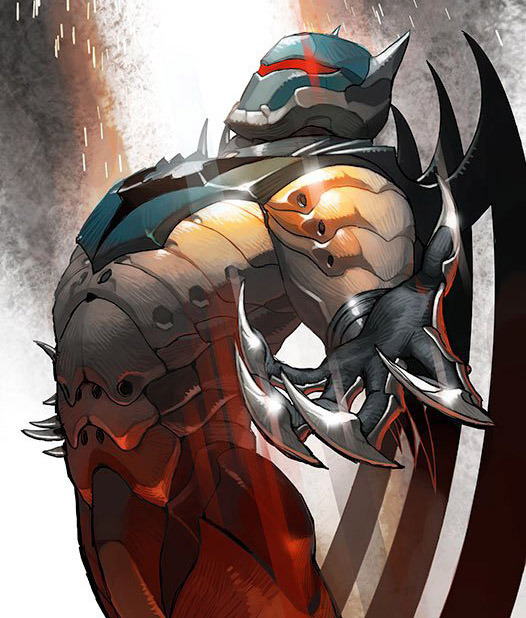
KnightsEnd
After the confrontation with Wayne, Jean-Paul's descend to madness worsened as the hallucinations haunted him constantly and he started a quest to stop Azrael's old enemy, LeHah, who was nowhere near Gotham. As Batman, Jean-Paul went on a brutal spree against criminals in order to find LeHah, while his hallucinations keep haunting him with more intensity, which in turn caused him to become even more ruthless.
His quest to find LeHah, brought Jean-Paul to confront corrupt businessman Penn Selkirk. When Selkirk couldn't provide him the answers he wanted about LeHah, Jean-Paul tried to murder one of his henchmen when he was stopped by Bruce Wayne, who had finally returned to claim the mantle of the bat. Jean-Paul would not give it away easily and the battle of the Batmen started. The struggle attracted the attention of the authorities, but when the building they chose to battle caught on fire, they escaped the place by attaching the Batrope to Selkirk's helicopter, which dragged them to the Gotham Bridge.
The fight continued on the bridge, but Jean-Paul was dowsed in flames because of his recklessness and the use of his flamethrower. After falling to the river, Jean-Paul pulled himself to the surface and realized that Wayne had fallen for his booby trapped Batmobile. He then confronted Robin and Nightwing with his armor Batsuit completely turned red. Nightwing attacked Jean-Paul, but after a long fight, Jean-Paul defeated Nightwing, almost killing him. Upon returning to the cave and thinking himself the victor above all his enemies, Jean-Paul was confronted by Batman, who had survived the explosion. The ensuing fight was short as Batman avoided violence and eventually forced Jean-Paul to remove the armor and face him without the mask. It was then that Jean-Paul admitted his defeat and abandoned the mantle of the Bat.
After his defeat, Jean-Paul lost control of his life and he wandered the streets of Gotham as part of the many homeless people living in the city.
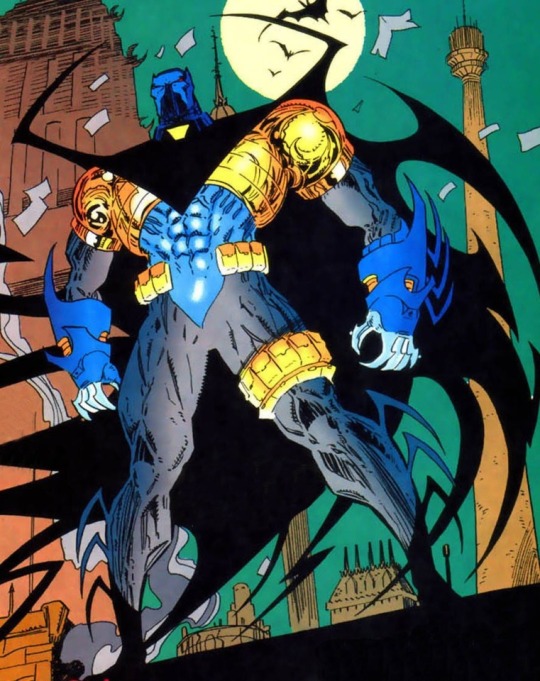
Agent of the Bat
After the Knightfall incident, Jean-Paul Valley became a vagrant, and was approached by Batman, who offered to give him funds to find out about his origins. This led to him to travel around the world, and he eventually destroyed the splinter faction of the Order of St. Dumas that had spawned him. He changed from being focused on his quarrel with the Order, to being strictly obedient to Batman, to finally becoming more his own independent crimefighter. He would make several costume changes throughout his life as Azrael reflecting his internal changes.
Azrael assisted the Bat-family regularly, acting as a major force during the Contagion fiasco, and as a large player in the No Man's Land crisis when Gotham City was abandoned by the United States government after an earthquake, becoming an impoverished gang-ruled battlezone. During this time, he found a kindred spirit in Batgirl, another child raised for a life of violence, and she in him. He regularly fought the forces of Biis as well, and worked actively to bring about the downfall of the Order of St. Dumas, a task in which he mostly succeeded. It was also during this time that Azrael encountered another new foe, Scratch. Jean-Paul, even in his civilian identity, was continually plagued by hallucinations presumably brought up by The System, manifesting both his own father and St. Dumas himself. His struggles with insanity were a recurring problem for him, although he was usually able to fight through them. After No Man's Land, Jean-Paul set up a clinic based in an old cathedral with Dr. Leslie Thompkins, with the help of his friend and mentor, former psychiatrist Brian Bryan.
Sometime after this, Jean-Paul established a base of operations for himself at a small castle-like structure formerly owned by the Order of St. Dumas. This castle was situated near Ossaville, a small community about 100 miles away from Gotham City with a population of less than 28 people. This base was in considerable disrepair, so Batman sent Harold Allnut to live with Jean-Paul in the building and repair it, as Jean-Paul lacked the necessary skills to do so. Jean-Paul established his position as the protector of Ossaville after he chased away a biker gang which was threatening it at the time.
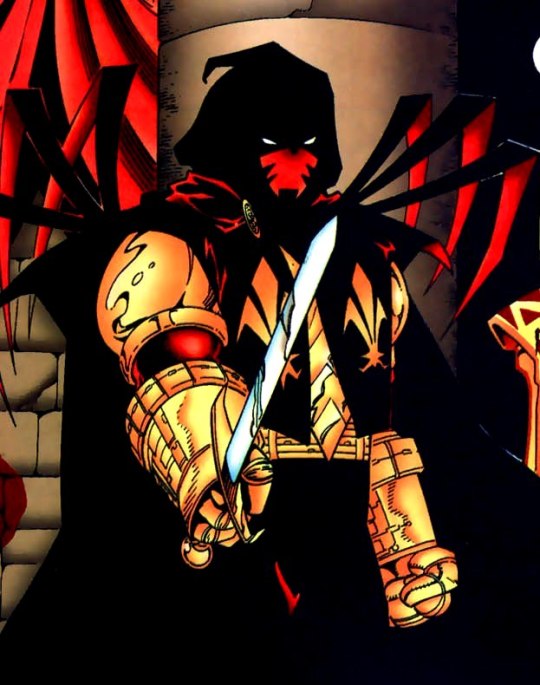
Death and Legacy
Azrael was eventually killed in a fight with his two greatest enemies, Biis and Scratch, following an attempt by the latter to once again frame Azrael for various crimes. Azrael was shot through his armor by multiple teflon-coated bullets, and then tumbled off of a balcony with LeHah. LeHah survived, and Scratch was arrested, but Jean-Paul tragically perished. Although his costume was recovered, his corpse was not.
Five years later, the Order of Purity, a splinter sect of the Sacred Order of St. Dumas created a new Azrael for Gotham City in ex-police officer Michael Lane, who has taken on his duties with gusto.
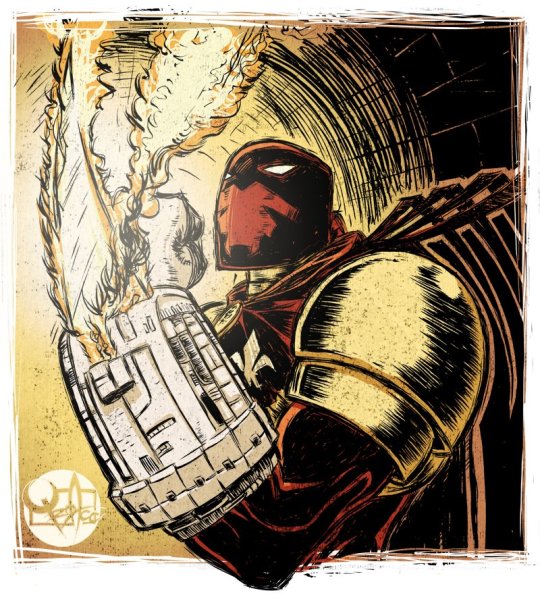
Blackest Night
Jean-Paul Valley was revived as a member of the Black Lantern Corps with a power ring. He murders a bystander, proclaiming, "You don't deserve a savior who sacrificed as much as I did to protect your corrupt and misled lives. You don't deserve Azrael!" He attempts to murder the Scarecrow, although Scarecrow simply isn't capable of feeling the fear that Black Lanterns feed on, thus is practically invisible to Azrael.

Fun Facts
The gauntlets used by Valley during his time as the Batman are now used by the Manhunter, Kate Spencer.
Azrael once fought the Punisher, but lost.
In his civilian identity, Jean-Paul wore round glasses.
Oracle frequently flirted with Jean-Paul, and confirmed that she had a crush on him.
Although Jean-Paul Valley once stated that he and his father shared the same name, other sources indicated that his father's name was actually just "Ludovic Valley."
Jean-Paul Valley is also known as Az-Bat.
#azrael#jean-paul valley#jean paul valley#jeanpaul valley#batman#johnny valli#batman family#Justice League Task Force#order of st. dumas#order of st dumas#Black Lantern Corps#dc#DC comics#thedcdunce
39 notes
·
View notes
Text
Joker Movie Thoughts

this is a bunch of jumbled, unstructured thoughts about the joker movie because I can’t stop thinking about it and I needed to write at least some of my thoughts down. might add to it every now and then. hope you enjoy it anyway if you end up reading it :)
MASSIVE SPOILERS BELOW THE CUT!!!!!!
watching the ‘joker’ movie felt like a very visceral experience for me. the movie manages to hold and intertwine many complicated themes alongside the plot so eloquently that I am not surprised it received an 8 minute standing ovation. I will be personally outraged if Joaquin phoenix does not receive an Oscar for his portrayal of the joker character because he manages to perfectly display the descent into madness as well as the tragedy of the movie. This movie manages to make you want to sympathise with Joker because the course of events leading up to him becoming the joker is very tragic and given the right circumstances would turn any sane man mad, yet you know you shouldn’t empathise with him because you understand he is mentally ill and that he sees violence as the only way to exact his revenge. Every scene in the movie is a trailer moment yet I didn’t feel like the movie was spoiled for me in any way.
Another aspect of the movie I liked is that Joaquin Phoenix manages to use his acting skill so well that he can subtly show how the joker’s descent into madness builds to a crescendo so spectacularly. How the first dance he does after his first kills is slow and controlled compared to that when he is fully embracing his madness and dancing on the steps so freely, because in his madness he is set free. It reminds me of Midsommar in that way slightly. Also, Joaquin’s body during the movie was also a strange sight and the dedication he put into the role to make himself look that skinny and ill simply astounded me. also, knowing that Joaquin improvised the dancing in the bathroom after Arthur's first three murders makes the scene all the more eerie to me. i hope he looked after himself after he finished filming for the movie because i dread another heath ledger situation, i don't think my heart could take it
I also appreciated that despite the amount of violence in the movie, a lot of the deaths are actually not shown. I think it’s a sign of good acting and good directing when the audience can guess what’s happened behind the scenes just from a few context clues (such as the end of the movie when he leaves the therapists office trailing bloody footprints)
I saw someone on twitter say that the joker movie is just Marxism in practise and honestly I can't fault their logic. The working class leading a violent revolution against the top 1% because they want better than the shitty lower hand they have been dealt, the fact that the newspapers in the film literally call it the 'kill the rich' revolution, the fact that Thomas Wayne literally calls them all clowns and it only ends up spurring on the revolt further. i mean, i can definitely see it.
The story is heartbreaking because it is believable. Watching as a mentally ill man is pushed to the extreme due to funding cuts for his therapy which ultimately stopped him getting the medication he needed to stay sane, poverty, an abusive childhood, a mentally ill mother whilst also living in a classist society where the working class are oppressed by people like Thomas Wayne. A good example of this to me is his first trio of murders; he only killed them because the three Wall Street type guys were going to beat him to death had he not pulled out the gun to kill them, yet it is certain that if Arthur had been killed by those men no one would care because he was not someone worth reporting on in the eyes on the media. In short, anyone below middle class in Gotham were considered nobody and they had enough. Arthur merely sparked the rebellion.
I enjoyed how the joker didn’t plan to become a political figure in the movie. He unintentionally becomes a martyr to the people of Gotham and how that tied in with the origins of batman was a very cool moment for me as part of the audience.
To add to this, the ending of the movie being dubious was an interested touch. Throughout the movie we learn that we cannot always trust Arthur’s perspective. From his fantasy of being on his idol’s TV show, down to his delusion of the romance between him and Sophie. So, the idea that the end of the movie suggesting it was all in his imagination was interesting to me. I, however, don’t subscribe to such a theory because I think the final flash of Bruce with his dead parents was the director giving us that subtle hint that this time the joker wasn’t just dreaming of being successful and loved by many, it was real this time.
A slightly less important note but the aesthetic of the whole movie was just very grainy and gritty and fit the film? like the old school format, the cinematography and the fucking SOUNDTRACK. 'that's life' by Frank Sinatra is one if my favourite songs and the fact is features so heavily in this movie was a really cool moment for me? i also really liked the whole riot scene; it just felt really raw and gritty and like a true climax to the joker's story as he finally becomes the persona fully and finds his new identity as the figurehead for this revolution in Gotham
Of course, I cannot talk about this film without mentioning my beloved heath ledger and his depiction of the joker, and the references and similarities between the two. Let me make one thing clear; phoenix’s and ledger’s joker are nowhere near the same. I remember reading that Joaquin and heath were very good friends, and that Joaquin did not in anyway want to impose on heath’s legacy. He understands how legendary that role was and said while he loves that portrayal he didn’t want to be a cheap imitation. I believe he has fully achieved such a feat but I cannot help but compare. Some ‘Easter eggs’ or possible homages to heath that I recognised were:
-the scene where Arthur is in the back of the police car reminded me very much of that scene in the dark knight where joker steals the cop car (ledger / phoenix). I realise that is is also supposed to parallel the scene earlier where he is sat all sad on the bus compared to how happy he looks in the police car but i didn't quite get it straight away.
-Arthur using his own blood to paint the smile on his face (x) after the car crash reminded me of the ledger makeup look
-Arthur saying to Sophie that he ‘had a bad day’ reminded me instantly of when heath ledger’s joker said something along the lines of ‘everyone is just one bad day away from being like me’
none-Ledger related Easter eggs I noticed too were:
-the protesters laying Arthur across the hood of the crashed cop car Jesus-style to signify that he's saintly to them was a nice touch
-Bruce coming down the fireman’s pole was reminiscent of the Adam west batman series where they had to come down the fireman’s pole
-the joker being attached to the death of Bruce Wayne’s parents (although less directly in this depiction)
-the font of the late night talk show is the same as batman the animated series
-I’ve seen some people say that the backdrop of the talk show is the same during the titles of the animated series too
-joker killing the host was reminiscent of the dark knight returns where joker kills the audience of a TV talk show
-apparently the look of this joker is similar to that of one of his video game iterations but I can’t find that
-the sort of reference to the inspiration behind the entire joker character by having Arthur have a condition where he can't help but laugh in certain situations, when the joker was based on the film 'the man who laughs' where a man is cursed to never stop smiling no matter how much he tries
-major inspiration from taxi driver, which also features Robert De Niro so its a cool touch
-some kind of reference to the movie 'the king of comedy', a movie centring around a person obsessed with a tv show host which has similar plot points and also features robert de niro again which is pretty cool
2 notes
·
View notes
Text
Film Analysis & Review: Joker 🃏
⚠️ N O T E : If you have not watched, please skip this post!
———————————————————————
Can we give ten minutes’ of applause to Joaquin Phoenix for his EXCEPTIONAL performance? 👏🏼👏🏼👏🏼👏🏼👏🏼👏🏼👏🏼👏🏼👏🏼👏🏼👏🏼
Ok let’s begin.
I was kept at the edge of my seat every minute of the film. He had me at the first scene. I remembered thinking, “I felt that.” How many times have we (pretty sure I’m not the only one) done the same?

As females we slap on our lipsticks, as men we slap ourselves on the cheeks; telling ourselves to sober up. Wiping tears away, we smile at the mirror, our reflections betraying the very emotions we feel deep in our hearts, bury them deep down and walk off, facing the world once again.
The movie doesn’t specifically say which time period this takes place in, but an educated guess would be take us between the 70’s to 80’s. If we were to work backwards from the recent Batman movies set in current times, plus heavy mentioning of Thomas Wayne in this film and how young little Bruce was before tragedy struck, the above is not hard to arrive at. And if we were to work with this timeline, it would give insight on the movie’s context and the people of Gotham set in that era.
The 70’s and early 80’s were a difficult period for the general public due to recession. Stagflation (high unemployment and inflation) was rampant and economic disparity only grew more apparent: the rich only seemed to accumulate more wealth while the middle-classes and poor became poorer. Naturally, people on the streets are on edge, they are generally not empathetic or understanding, especially to those deemed ‘different’ from them. It was a “every man for himself” world. Things like mental illness and depression were definitely not spoken of, for fear of continued unemployment.
While us viewers were able to sympathise with Arthur Fleck (Phoenix’s movie character), the above could possibly highlight the reasons for their behaviour towards him. They were otherwise cold, took advantage of Arthur, bullying and beating him not because they couldn’t understand, but they didn’t care. They could only afford to care for themselves. I couldn’t possibly count the number of times my little heart broke whenever he got mistreated for pseudobulbar (inappropriate bouts of crying or laughing).
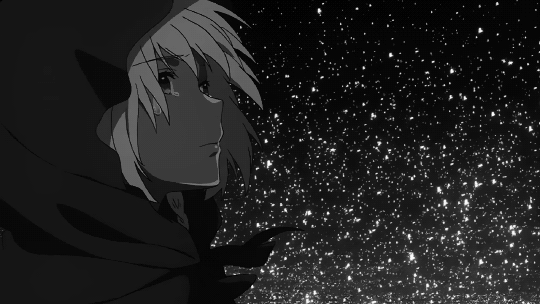
My childhood friend, whom I watched the movie with, pointed out that all along, Arthur’s mother Penny Fleck could support herself. She was a perfectly fine human being, but due to her narcissistic personality disorder, she relied on Arthur to care for her, from bathing to feeding, and even carrying her around the house. Arthur may not have known about this, yet due to his delusional disorder, he could possibly have imagined his mother sustaining something serious that she could not perform daily activities on her own.
A huge theme was also the blatant representation of depression. I strongly believe the only reason keeping Arthur alive until he learnt the truth, was Penny. We see from the film later on that his relationship with Zazie Beetz’ character Sophie Dumond was all in his head. It was also told to us that his stand-up stint at the pub was a horror show. Apart from his co-workers whom he didn’t see after getting fired and his mother, Fleck did not have any companion at all.
It was obvious he contemplated suicide, from the scene in the lift where he formed a gun with his fingers and ‘shoots’ the side of his head to him actually firing a gun in his house. His mother also said some really awful stuff to him with regards to Arthur wanting to be a comedian. “You don’t have enough funny in you.” Words seriously hurt, especially if it comes from a loved one. He did not have the support of his mother, even though she always told him he was her ‘happy’. Yet he may also have imagined her saying the above, no thanks to his condition.
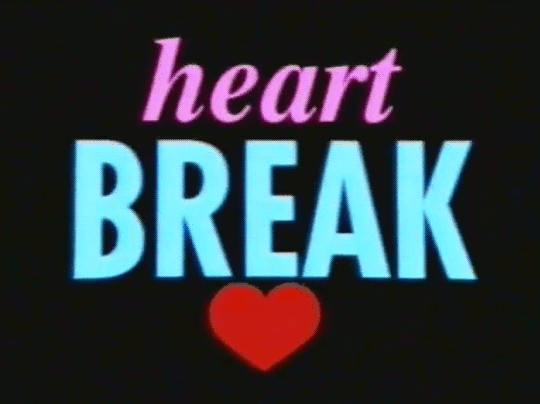
His almost-complete lapse in social cues, no thanks to his traumatic childhood, also made it really hard to have friends. The scene of Fleck taking notes during a stand-up was blatant enough. He was laughing at all the wrong timings.
I read this before and I thought it really true: “Friendship is unnecessary, like philosophy, like art... It has no survival value; rather it is one of those things that give value to survival.” - C.S. Lewis. Arthur’s world crashed, literally, when he found out the truth about his mother and his birth.
The amount of cruelty and ridicule Arthur received from the public also made him the ‘Joker’ we now know him by. You may not agree with me, but I felt that he was the by-product of society. By killing and causing chaos, he relieves some of the pain caused to him throughout his entire life. He also “hits back” at society for all the times he was abused by its very system and people.
Something to note is that while Arthur has not met all of Maslow’s Hierarchy of Needs before moving up to self-actualisation. He could not meet his needs, many thanks to society, yet he manages to achieve transcendance, also through society. It basically hands it to him; from unconsciously becoming the face of the clown face movement that sparked riots in the movie, to being hailed as an icon of rampaging chaos throughout Gotham. This derives in him ‘purpose’ in life, to simply create chaos, and that his self-identity is void due to his unmet areas of Maslow’s hierarchy.
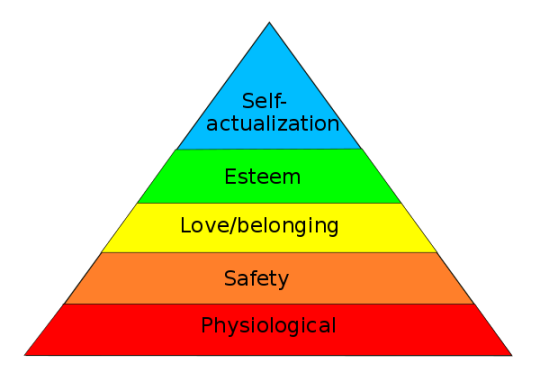
Comic book fans would not like this portrayal of Joker due to the difference in storytelling. Comicverse’s Joker fell into a tank of chemical waste and thus became who he is; his sense of humour was also described as sadistic, not depressing as portrayed in Todd Phillip’s take on Joker.
I also get why Joaquin’s character did not obtain a lot of fan conversions from its cinematic lovers as well. The Joker (RIP Heath Ledger 😭) of The Dark Knight (2008)/The Dark Knight Rises (2012) was a scheming, though equally ruthless jokester and this film is a complete deviation from Phillip’s treatment of the same character.
I highly respect Todd’s take however, from its storyline to the really great visuals; I loved every second of footage. Something I learnt and always enjoy exploring in film theory is the message behind the film. “Why was the film released in this specific time period? What is the director trying to portray by releasing this?” This movie came out only this year, a time where mental health awareness is heavily talked about, and also a time where economic recession is speculated to set in.
I think this movie is a great 101 for those who do not know much about mental illness and depression. It helps one to empathise with sufferers and hopefully ignites something in sufferers to not give up but seek help. It sends a message to the masses about mental health and in my opinion, this makes it a good movie. Releasing a film in our current times also makes it all the more relevant to who people can become in light of trying periods ahead.
A food for thought would be the metaphorical meaning of the film visuals. Another question I was taught to ask was, “Is there a reason why this film is shot this way, with bright colours/black and white?” I don’t know about you, but despite the film’s heavyness, its vibrant visuals and even Joker’s outfit bears a stark contrast. It led me to consider how in society, we put on a ‘happy’ front, to mask the fact that on the inside, we are a depressed, sad bunch. To distract from what’s actually real here.
All in all, I respect that every actor is also an artist, and everyone has their own interpretation of Joker. I liked all three cinematic portrayals, yes even Jared Leto’s, all for different reasons.
I really like this movie; it’s an 8/10 for me, except I just felt that IMDA’s (Singapore) classification of this film should have been M18 instead. It kinda is too heavy for a sixteen year-old.
But these are just my thoughts. Thank you for reading, if you even made it this far! 🤗
0 notes
Text
Joker Review
I was not excited to see Joker based on the trailers that seemed determined to excuse and justify Joker’s (Joaquin Phoenix) madness and motives with a sympathetic light. While it is well-shot and well-acted—and if you enjoyed it, I’m glad you got something positive out of the experience—I thought the movie confirmed my impression of the trailers and I wasn’t a fan.
Full Spoilers…
Arthur Fleck is a sad, lonely man with vague mental illnesses who can’t catch a break in life or love. His life does suck and he does get dealt several bad and unfair hands, but nothing this movie did convinced me to feel sorry for him because I know the monster he’s going to become. It’s the same way I don’t care about real-world rapists’ “bright futures” being put in jeopardy by being held accountable for their crimes and have no sympathy for mass shooters’ sad histories of being turned down for dates. In the end, society is a problem, but how Arthur reacts to it is all on him and what he becomes is reprehensible, so I found it impossible to connect to him even before the villainy. Maybe if he were an original character—or even a Batman villain who does have a spark of good intentions and true tragedy to them, like Mr. Freeze, Poison Ivy, or Two-Face—I would’ve cared about him, but the Joker has far too much baggage to be painted as a tragic figure, and drawing this character so close to being an anti-hero who’s right to act like he does is gross. Even if the adoration he gets from the rioting crowds after the car accident is his imagination (much like he imagined Sophie (Zazie Beetz) thought stalking her was charming at the beginning of their “relationship”), he still felt that hero-worship throughout the movie from the protesters adopting his clown persona so I don’t think it makes a big difference if that one post-accident scene was real or not.
I didn’t like the choice to make most of his laughter part of his illness either, as that took a huge part of the character’s outlook/personality and sense of “humor” away by making it something uncontrollable. It’s also an antiquated and harmful view of mental illness in a time when we’re fully aware that mentally ill people are far more likely to be the victims of violence than the perpetrators. Continuing to draw mentally ill people as violent criminals is something that needs to be addressed and updated in the larger Batman canon too. Like so many other choices here, explaining his laughter takes away the scariness the character previously had. I have no problem knowing who Joker used to be, but knowing why he does what he does (even just trying to convince us that he’s an “agent of chaos”) is too much information in my opinion. My preferred Joker is one who’s unpredictable and incomprehensible, where trying to puzzle out his motives either leaves you dead or drives you insane (like it did Harley Quinn). I also want more variety in his crimes, not just a series of revenge killings for personal slights and abuses. Give me everything from trying to patent Joker Fish to deadly laughing gas attacks to just wanting to pie Batman in the face for Christmas. During his big debut on TV in this film, I was wishing we could see a classic caper instead (even though yes, hijacking a TV show is something Joker would do). Confining Joker’s victims to people who personally attacked him also takes away from the threat he poses: if you treated him well, you’re totally fine here.
While escalation to more indiscriminate victims is possible, as one of my sisters pointed out, the movie works really hard to justify everything he does with grounded motives in what feels like an attempt to say “see, anyone really could be pushed to this breaking point!” It’s not enough that Arthur’s co-workers don’t like him, one of them (Glenn Fleshler) has to essentially trick him into getting fired. Arthur’s obsessive love of TV personality Murray Franklin (Robert De Niro) turning dark can’t just be a result of Arthur being a stalker who dreams of being a comedian even though he’s not funny, Murray also has to personally insult Arthur in front of the city/nation. It’s not bad enough that Arthur’s mom (Frances Conroy) abused and lied to him his whole life, but his secret “father” Thomas Wayne (Brett Cullen) also has to be a horrible rich person. I totally get that Thomas would be furious about Arthur touching Bruce (Dante Pereira-Olson) and I’d be enraged too, but Thomas’ anti-poor sentiments set him against Arthur’s social situation and in the end it felt like we weren’t supposed to see his and Martha’s (Carrie Louise Putrello) deaths as a tragedy, but as a reaction to the way they treated the lower classes (since the riot is so closely tied to the way Arthur reacts). On a side note, Martha really just isn’t ever going to speak or contribute to a story at all beyond being a victim, is she? Anyway, my reading of Joker’s “you wouldn’t get the joke” line at the end of the movie was that the Arkham interview scene occurs after Batman had appeared and everyone’s favorite “badass” hero grew up to protect the system (the “care to explain the joke?” question is intercut with scenes of the Wayne murders). This Bruce would totally embody the “Batman’s a wealthy guy who beats up poor people” take that’s been going around for the past few years (just imagine how this Thomas was raising Bruce, instead of the good man that Thomas usually is), particularly since it was apparently someone protesting for fair wages and equality that murdered his parents. The clothing styles do look the same in that interview scene as in the rest of the film, rather than being 90s styles or later, but arresting some fashions and technology even as time moves on is hardly a new design choice for a Batman movie/animated series. Even if that’s not the joke that Arthur means in that final scene, I fully believe that’s the Batman that would come out of these events, and who wants that?
If the joke that Arthur references is that the world put all this meaning on him that he didn’t intend, it’s not a very good joke because he has a whole speech explaining that on TV. I believe Joker when he says he’s not political—he’ll take revenge on anyone, rich and poor alike—but having the protesters adopt his ideology and imagery is a really weird choice given who he is in the comics. Even though he doesn’t have anything to do with the protests themselves (though he does egg on the riots during his speech, as what he says about his own mistreatment by society is also what they’re feeling about theirs), the filmmakers saddling “his” movement with the language of the real-life left (like "resist") is extremely questionable: why are the filmmakers trying to make this monster a heroic inspiration (even if misunderstood) for what would be the social justice side? In The Killing Joke, Joker argues that one bad day will drive anyone insane, which seems to be what this movie wants to say too (with “insanity” framed as a “reasonable” reaction to a broken system). However, the end of The Killing Joke reaffirms that the world isn’t like Joker and one bad day won’t push most people to villainy, since he fails to break Gordon, Barbara, and (once it became an in-continuity tale) Batman. Joker has no one to make that argument, and instead has Joker give a speech on TV about how it’s totally justifiable to go on a murder spree in reaction to being mistreated because “this is what you get.” No thanks.
If the “joke” is that none of this happened at all, well then…why are we here watching his self-indulgent delusions of persecution and oppression?
If they wanted to make a movie about a sympathetic man turned bad by a cold system that hurts people who do nothing but get sick, they should’ve made a Mr. Freeze movie. A film about someone who goes to increasingly extreme lengths to change the world for the better while being labeled as crazy by society? Get a Poison Ivy film into production. Want to explore a villain with good intentions and a society divided between the rich and poor, with how you’re treated by people, the law, and the world left up to chance on how you were born? Then this should’ve been a Two-Face movie. There’s merit to saying that there are problems with our social system and that it fails people who have no other support network, for sure. And lots of bad guys have been successfully drawn with some core good idea that they take off the rails into full-blown villainy as they commit increasingly evil acts. The Joker is not one of those villains. He doesn’t have a logical point and shouldn’t be painted as right in any way.
Again, on a technical and performance level Joker is a well-made movie and I’m glad if you found something worthwhile here, but I vehemently disagree with its entire premise of making the Joker understandable and especially with trying to paint him as something of an anti-hero with a twisted point who’s justified in acting the way he does. I was bored and couldn’t get past the knowledge of what Joker becomes. This is just not for me. Oh well; on to the next movie!
Check out more of my reviews, opinions, and original short stories here!
0 notes
Text
Joker movie: some thoughts
Despite some hesitation, I decided to go see the Joker movie directed by Todd Philips in the theater. I have many thoughts about it and they might be haphazard but bear with me. Since I write this for my personal blog and not a professional one, I see no reason to organize my thoughts (but at least I’m checking for spelling and grammar).
Major spoilers follow, including the ending. You have been warned.
I write this as a movie buff and a long time comics fan.
The central question I keep hearing about this movie is “is this movie a celebration or condemnation of American white terrorism and the feelings that give rise to it?”. I am of the opinion that movies are not obligated to send a clear moral lesson and of course the best movies have moral ambiguity requiring thought on the part of the viewers (The Godfather involved mob leaders being the heroes and committing many murders).
The Joker movie did not seem to clearly side one way or the other on the issue. I did notice certain, subtle forms of racism and mysogyny but I’ll get to that.
The plot is simple: mentally-ill wannabe-comedian Arthur Fleck (played by Joaquin Phoenix) has one bad day that turns him into the titular anarchic, psychotic super-villain. In the movie, he is presented as a anti-hero. His motives are purely selfish and self-centered and until he becomes the center of attention, he ignores all the happenings in the greater world around him. Of course, his tragic backstory gives him reason for this (raised by a psychotic mother played by Frances Conroy and beaten by her ex-boyfriends in his youth).
Arthur Fleck is also, during the course of the movie, made to believe that his father was Thomas Wayne, making Bruce Wayne his half-brother. In my opinion this could have been an awesome complication added to the Batman myth, but it was later revealed that he was adopted and therefore not the blood relative of anybody. Truthfully, it’s left vague and that’s probably for the best. Joker best serves as a villain when his history is unknown. Jack Napier, Jeremiah Valeska and Arthur Fleck are all pseudonyms for this unknown person.
Alfred and Bruce himself appear in a disturbing scene when Arthur was waiting outside the front gates of Wayne Manor. No thoughts about it other than it was a creepy scene.
I did notice that everyone who seems to help Arthur and take care of him is a person of color or disability (who tend to know what it’s like to live near American society’s bottom): the British little person who was part of his clown job, his two African-American female therapists in the movie as well as the African-American clerk who finds his mother’s historical file at Arkham Asylum. Also the “girlfriend” they gave him was an African-American woman in his building. I use the word in quotes because she’s almost a non-character in the story. I’m amazed she didn’t end up in a refrigerator.
All the cops (who become more and more Arthur’s enemies by the end of the movie) are white males. A child gang beats him and steals a sign he was carrying near the beginning of the movie. I believe they were Hispanic but I don’t recall clearly.
It seems that Todd Philips and his crew was trying to say something about the race/class correlation and how the destitute are overwhelmingly people of color while the wealthy and powerful were majority white. I did wonder why women (other than his mother. Actually, maybe his mother as well) were reduced to caretakers or “girlfriends” in his story. It’s subtle, but it’s something to think about. Like Gene Roddenberry’s use of women as caretaker characters in the Next Generation, such as doctors and therapists.
One of the surprise endings of the movie is that the riots brought on by the Joker lead to the murder of Bruce Wayne’s parents. Perhaps he’s trying to say that anarchic behavior leads to the pendulum swinging the other way. To quote Frank Miller, “Joker, there’s nothing wrong with you that I can’t fix. With my hands.”
The media plays a role in the movie too as represented by talk show host Murray Franklin as played by Robert Deniro. The movie definitely highlights the media’s tendency for sensationalism and to spotlight mentally sick people. That tendency even elects presidents.
Todd Philips intentionally used an old-school Warner Brothers introduction to the movie as well as going totally old-school cinema and having “The End” appear on screen at the end. He did go for a 70′s cinema vibe in the movie. I saw a lot of “Taxi Driver” and “The King Of Comedy” in this movie (both directed by Martin Scorsese. Maybe that’s why he was speaking out against comic book movies). Truthfully a lot of Batman shows have used that historical vibe, such as Gotham and Batman: The Animated Series.
DC has pretty much abandoned the concept of continuity in its movies (as has Marvel), but with some minor changes this could have been a good prequel to any of the Batman movies. But there’s a multiverse now so there’s no need.
While the “one bad day” concept from the movie was inspired by the Alan Moore / Brian Bolland Joker story “The Killing Joke”, I note that only Bolland’s name are in the end credits. That’s a pity. I think this is one of the few comics-related movies that Alan Moore would enjoy.
I think whatever you feel about this movie depends on you. If you feel that a failure to clearly condemn the white terrorism that results from angry white folks, then this probably isn’t the movie for you. But again, it doesn’t justify it either. It tells a story. Only a Sith thinks in absolutes.
On a personal note, I’m of the belief that we should punch Nazis. If we tolerate intolerance then some day tolerance would be gone.
There’s a line from a Batman comic from ages ago that stuck with me. I think it was written by Denny O’Neil. Some cop was trying to blame Batman for the actions of a criminal that was inspired by him and he responded. “No. If I didn’t exist, he’d find some other reason to do what he does.”
In conclusion, if anybody uses this movie as an excuse to commit violence, they’re an asshole and if the movie didn’t exist, they’d find another reason to commit violence and therefore be an asshole.
1 note
·
View note